|
|
|
Sort Order |
|
|
|
Items / Page
|
|
|
|
|
|
|
| Srl | Item |
| 1 |
ID:
139280
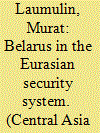

|
|
|
|
|
| Summary/Abstract |
The Republic of Belarus occupies the western periphery of geopolitical Eurasia, by which I mean the post-Soviet space, and is fairly far removed from Central Asia. This distance, however, does not mean that Belarus is safely protected from the security threats emanating from the Central Asian region, and, on the whole, Inner Eurasia. The Belarusian expert community is not indifferent to these problems. Belarus has preserved its military and strategic importance for Russia within the categories of European confrontation of the previous period. Today, it is consistently and actively involved in military integration within the CSTO. The armed forces of Russia and Belarus are tied together by the so-called coalition approach. Civilian and military experts of the Republic of Belarus are studying the hypothetical possibility of its involvement, at the technical level, in the Collective Rapid Reaction Force of the CSTO if and when NATO pullout of Afghanistan sends waves of instability across Central Asia.
|
|
|
|
|
|
|
|
|
|
|
|
|
|
|
|
| 2 |
ID:
139278
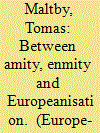

|
|
|
|
|
| Summary/Abstract |
Considering the development of the Bulgarian energy security strategy this article analyses how the country has adapted to EU membership and to energy security challenges, such as disruptions to Russian gas supplies in 2006 and 2009 and rising gas prices. Utilising a conceptual lens which synthesises Regional Security Complex Theory and Europeanisation, the article offers an explanation of energy policy changes. It concludes that conceptions of Russia as an energy security guarantor have changed since Bulgaria's EU accession and that Bulgarian energy policy has undergone a qualified reorientation away from a positive dependence on Russian energy sources, towards a convergence with EU priorities of diversification and a single energy market.
|
|
|
|
|
|
|
|
|
|
|
|
|
|
|
|
| 3 |
ID:
137705
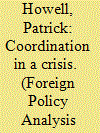

|
|
|
|
|
| Summary/Abstract |
This article explores possible theories of international economic policy coordination, and then proceeds to test these theories through a qualitative analysis of four EU member states – Germany, France, Belgium, and the Netherlands – and their preferences and experiences during the financial market crisis period of Fall/Winter 2008–2009. Both institutional and basic realist theories for coordination preferences are evaluated for explanatory power against the case of the 2008 financial crisis and are found lacking. Instead, this analysis finds that a comparative foreign policy theory of political constraints – institutional design, political polarization, and leader time horizons – emerges as the best fit for explaining the divergence in foreign policies among these EU member states.
|
|
|
|
|
|
|
|
|
|
|
|
|
|
|
|
| 4 |
ID:
137403
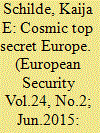

|
|
|
|
|
| Summary/Abstract |
As the EU has expanded its authority into areas of high politics such as monetary, defense, and foreign policy, it has simultaneously developed procedures for handling more sensitive and classified information. These critical policy domains require standards regulating secure information and personnel, but the concept of official secrets is in tension with the treaty norms of the EU. Observers allege that the classified information policy of the EU was imposed through the coercion of external actors such as North Atlantic Treaty Organization (NATO) and the USA in a significant historical departure from the information security policies of European member states. This article evaluates the content of EU-classified information policies and compares them to the content of European member states, NATO, and the USA, in an effort to clarify the mechanisms of policy diffusion in the area of information security.
|
|
|
|
|
|
|
|
|
|
|
|
|
|
|
|
| 5 |
ID:
137420
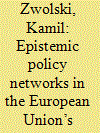

|
|
|
|
|
| Summary/Abstract |
This paper offers insights into an innovative and currently flagship approach of the European Union (EU) to the mitigation of chemical, biological, radiological, and nuclear (CBRN) risks. Building on its long-time experience in the CBRN field, the EU has incorporated methods familiar to the students of international security governance: it is establishing regional networks of experts and expertise. CBRN Centers of Excellence, as they are officially called, aim to contribute to the security and safety culture in different parts of Africa, the Middle East, South East Asia, and South East Europe, in the broadly construed CBRN area. These regional networks represent a modern form of security cooperation, which can be conceptualized as an epistemic policy networks approach. It offers flexibility to the participating states, which have different incentives to get involved. At the same, however, the paper identifies potential limitations and challenges of epistemic policy networks in this form.
|
|
|
|
|
|
|
|
|
|
|
|
|
|
|
|
| 6 |
ID:
137536
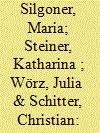

|
|
|
|
|
| Summary/Abstract |
We investigate the impact of the emergence of China as a global competitor on the trade performance of Central, Eastern and Southeastern European (CESEE) countries at the EU-15 market, i.e. the fifteen EU members as of 1995. The main aim of the paper is thus to challenge the common view that China crowds out exporters from European markets. The paper takes a comprehensive approach in terms of empirical methods and data. We analyze export growth, export market shares, extensive and intensive margins and the dynamics in the number of joint trade links (Dynamic Trade Link Analysis), applying highly disaggregated data at the 6-digit HS level over the period 1995–2010. We show that the most contested markets are those for capital goods and transport equipment, product categories where both regions have gained market shares and comparative advantage. We show that the number of trade links at the product level where both regions are active has increased substantially, indicating intensified competition. At the same time hardly any trade links were lost, which points against cut-throat competition between CESEE and China. The decomposition of export growth along the extensive versus the intensive margin shows that in line with the literature, the deepening of already existing trade relationships (i.e. the intensive margin) contributed most strongly to export growth in both regions, whereas the contribution of new trade links (i.e. the extensive margin) had only a minor contribution, apart from the instance of EU accession, which boosted the extensive margin considerably. We further decompose intensive margin growth into demand related structural effects and a supplier related competitiveness effect. Both the CESEE region and China successfully intensified their trade linkages above all as a result of their outstanding competitiveness as shown by the econometric shift-share analysis. While this suggests that both regions pursue a suitable export strategy, further diversification of production towards promising new industries and markets will become increasingly crucial for both, especially in face of projected slower EU-15 market growth in the longer run.
|
|
|
|
|
|
|
|
|
|
|
|
|
|
|
|
| 7 |
ID:
137155
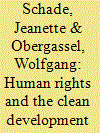

|
|
|
|
|
| Summary/Abstract |
The 2010 UN climate conference in Cancún emphasized that ‘Parties should, in all climate change related actions, fully respect human rights’. However, so far there is no further guidance. This article discusses the relevant legal human rights norms and two case studies from the Kyoto Protocol's Clean Development Mechanism (CDM). The first case (Bajo Aguán, Honduras) shows that the current absence of any international safeguards can lead to registration of highly problematic projects. The second case (Olkaria, Kenya) suggests that safeguards, introduced here as a side effect of World Bank involvement, can have a positive impact, but that it is necessary to have them based on human rights. It therefore seems recommendable that the UN climate regime develop mandatory human rights safeguards. In addition or alternatively, individual buyer countries or groups of countries, such as the European Union, could introduce their own additional requirements for CDM projects
|
|
|
|
|
|
|
|
|
|
|
|
|
|
|
|
| 8 |
ID:
137417


|
|
|
|
|
| Summary/Abstract |
The 2011 Libyan civil war prompted a reassessment of the normative foundation of the EU's conventional arms export control regime as armaments manufactured in Europe were used by Gaddafi's forces during the war. The EU's foreign policy identity is based, partly, upon a common approach to arms export involving respect for common criteria for export licences. Yet, prior to the civil war, considerable amounts of military equipment had been exported by member states to Libya, notwithstanding grounds for restraint on the basis of several of the criteria. This article traces member states' arms export to Libya during 2005–2010 to explore whether member states favoured restraint or export promotion. It concludes that although aware of the risks of exporting, in a competitive market for military goods, member states sought commercial advantage over restraint, and comprehensively violated export control principles. This casts doubts on assertions of the EU acting as a “normative power”.
|
|
|
|
|
|
|
|
|
|
|
|
|
|
|
|
| 9 |
ID:
137409
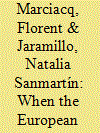

|
|
|
|
|
| Summary/Abstract |
Once only coordinating the foreign policy of its member states, the European Union (EU) now endeavors to speak on behalf of non-EU states. In the Organisation for Security and Cooperation in Europe (OSCE), its declarations are often backed by a large number of countries. This article enquires into the function of diplomatic alignment. Its findings question the use of alignment as a normative benchmark for European integration. It argues that adherence to EU norms is not the only rationale for alignment, and, more interestingly, that there are valid reasons not to align, which do not contradict EU norms, as well as more questionable reasons to align, which do. This article, in conclusion, argues that the function of alignment supports the EU's claim for international leadership, and that the reactions of non-EU states should be gaged in the light of this venture.
|
|
|
|
|
|
|
|
|
|
|
|
|
|
|
|
|
|
|
|
|